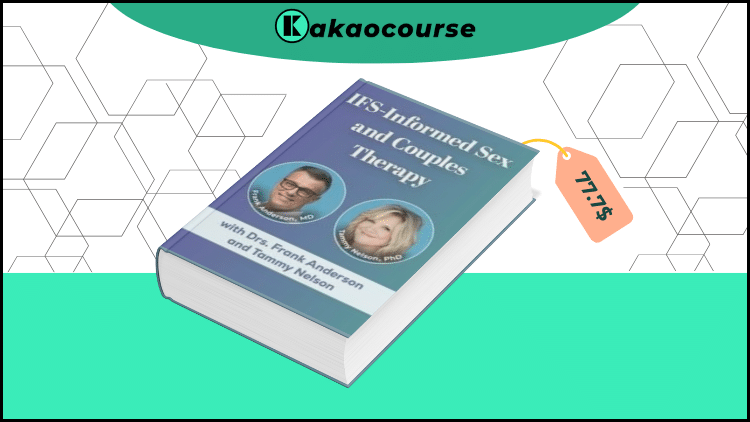Free Download IFS-Informed Sex and Couples Therapy by Frank Anderson and Tammy Nelson – – Here’s The Content Available For You:
IFS-Informed Sex and Couples Therapy by Frank Anderson and Tammy Nelson, Check Out the Full Course Contents:
IFS-Informed Sex and Couples Therapy by Frank Anderson and Tammy Nelson, Quick Free Video for More Information:
Overview this course
IFS-Informed Sex and Couples Therapy is a professional training designed for clinicians who want a clear, compassionate, and empirically grounded way to talk about sex, desire, and intimacy in the therapy room. Co-taught by Frank Anderson, MD and Tammy Nelson, PhD, this program brings together two influential voices: a leading IFS trainer with deep expertise in trauma treatment, and a pioneering sexologist shaping how clinicians address erotic wellbeing and relational repair.
At the heart of the course is the Internal Family Systems (IFS) lens—working respectfully with “parts” that carry shame, fear, longing, pleasure, and protection. Rather than skimming the surface of technique, the curriculum shows you how to integrate IFS with state-of-the-art sex and couples interventions so that clients can safely explore identity, heal sexual wounds, and build authentic intimacy. You’ll see how Integrative Relationship Therapy (IRT) intertwines with IFS, the Gottman Method, Imago, and Emotionally Focused Therapy, translating theory into actionable clinical moves.
The learning journey is intentionally sequenced. You’ll start with foundations for assessing barriers to desire and connection, then move into IFS essentials for sexuality, parts-based interventions for emotional intimacy, strategies for erotic development, trauma-responsive work, and advanced applications for affairs and therapist self-work. The course culminates in a full session deconstruction, so you can watch these methods in real time and understand the “why” beneath each step.
To deepen your practice, you’ll also gain access to two applied workshops: one focused on betrayal trauma in couples work, and one on rekindling desire in low-sex or sexless partnerships. The result is a comprehensive training that helps you help clients cultivate safety, pleasure, and connection—without bypassing complexity or pathologizing sexuality.
Why should you choose this course?
1) A truly integrated model, not a toolbox of tips
Most clinicians learn sex therapy techniques and trauma models in parallel. This training synthesizes them. You’ll learn to make sense of sexual problems through a parts-based map, then apply targeted couple and sex therapy interventions with timing and attunement.
2) Faculty at the forefront
-
🧠 Frank Anderson, MD brings decades of trauma expertise and IFS leadership to help you work safely and precisely with internal conflicts around shame, identity, and desire.
-
❤️ Tammy Nelson, PhD advances a pragmatic, affirming approach to erotic wellbeing and relational repair, operationalizing methods that clinicians can use the very next day.
3) Depth with practicality
The program balances conceptual clarity with step-by-step demonstrations, scripts, and decision trees—ideal for clinicians who want to do more than just understand.
4) A destigmatized, inclusive stance
Sexuality is approached with cultural humility and clinical precision. The material honors diverse expressions of identity, orientation, and relationship structure, helping you engage respectfully with clients across backgrounds.
5) Training that expands your scope of competence
Whether you’re a couples therapist seeking trauma-informed erotic skills, a trauma specialist wanting to address sex explicitly, or a sex therapist eager to strengthen your parts-work fluency, this course meets you where you are and raises your ceiling.
What You’ll Learn
Clinical Foundations for Sexuality and Intimacy
-
Identify common barriers to desire, arousal, and connection across the lifespan.
-
Use an integrative assessment to map attachment patterns, sexual scripts, cultural factors, and protective strategies that keep partners stuck.
-
Understand how IRT organizes interventions from Gottman, Imago, EFT, and IFS into a coherent sequence.
IFS Essentials for Sex and Sexuality
-
Translate IFS core concepts—Self energy, protector parts, exiles—into sexual health work.
-
Recognize shame-laden parts and polarization (“pursue/withdraw,” “risk/avoid”) that derail desire and pleasure.
-
Apply targeted steps to unblend from protective parts so clients can access curiosity, compassion, and consent.
Parts Work and Emotional Intimacy
-
Coach partners to notice and name their parts in the moment (“the fearful part,” “the critical part,” “the longing part”) to prevent escalation.
-
Intervene with specificity: direct access, parts mapping, and micro-contracting to create safety for disclosure.
-
Dismantle intimacy blocks with structured dialogues that build trust, differentiation, and co-regulation.
Enhancing Erotic Wellbeing with IFS
-
Replace performance-driven goals with a pleasure-process orientation rooted in Self leadership.
-
Co-design erotic experiments that respect parts’ limits while expanding flexibility and play.
-
Help clients renegotiate boundaries, meaning, and values around sex and desire.
Healing Sexual Trauma Through the IFS Lens
-
Engage protective parts that manage triggers, dissociation, or numbing without shaming their function.
-
Pace trauma processing with a titrated, parts-informed plan that prioritizes safety and consent.
-
Foster post-traumatic growth by integrating body-based practices with parts work.
Navigating Affairs in Therapy
-
Map the affair through an IFS-informed, non-pathologizing lens to understand needs, vulnerabilities, and protective strategies.
-
Structure staged repair: accountability, meaning-making, boundary renegotiation, and erotic re-awakening.
-
Use parts-based dialogues to transform betrayal narratives into collaborative healing plans.
Therapist Parts and Sexuality
-
Identify your own therapist parts that get activated around sex, kink, orientation, gender, or infidelity—and build capacity to stay present.
-
Cultivate Self energy in challenging sessions so that your interventions land as compassionate, not corrective.
-
Develop reflective practice rituals that keep you attuned and ethically grounded.
Client Session Deconstruction
-
Observe a complete session and hear faculty commentary unpacking clinical decisions, sequencing, and repair attempts.
-
Translate what you see into a repeatable framework you can adapt across cases.
Applied Workshops (Included)
-
Betrayal Trauma in Couples: Use complex-PTSD-informed strategies to restore safety and rebuild trust with clarity and care.
-
Low-Sex/Sexless Partnerships: Address avoidance, pleasure resistance, and rejection cycles; co-create individualized pathways back to desire and connection.
By the end, you will be able to:
✅ Conduct a parts-informed sexuality assessment that integrates trauma history, attachment, identity, and couple dynamics.
✅ Unblend from protector parts and access Self energy—your own and your clients’—to reduce shame and increase choice.
✅ Use IRT sequencing to decide which intervention to apply when (e.g., Gottman skill-building, EFT enactments, IFS unburdening, or erotic exercises).
✅ Guide partners through accountability, reconnection, and erotic renewal after breaches like affairs or chronic avoidance.
✅ Apply trauma-responsive pacing for clients with sexual trauma, minimizing retraumatization and maximizing agency.
✅ Confidently discuss sexual identity, pleasure, and boundaries without pathologizing diversity.
✅ Maintain therapist self-awareness so your interventions are anchored in presence rather than reactivity.
Who Should Take This Course?
This training is ideal for clinicians who want to bring clarity, compassion, and structure to complex intimacy work:
-
Couples and marriage therapists seeking a trauma-informed, sex-positive framework.
-
Sex therapists who want a robust parts-based model to resolve shame, polarization, and desire discrepancies.
-
Psychologists, counselors, social workers, and psychotherapists who encounter sexual themes and want competence—without overstepping scope.
-
Psychiatrists and physician-therapists integrating medication management with relational and sexual health goals.
-
Trauma specialists expanding treatment to include erotic recovery, embodiment, and identity exploration.
-
Coaches or allied professionals with clinical training who collaborate with therapists on relationship health, within appropriate ethical boundaries.
-
Graduate students and early-career clinicians who want a strong foundation before patterns harden.
The course takes an international perspective, welcoming practitioners who serve culturally diverse clients, LGBTQIA+ communities, and a wide range of relationship structures. If you value evidence-informed practice, reflective self-work, and clients’ autonomy, you’ll feel at home here.
Conclusion
Sex is not a side topic in therapy—it is a central arena where attachment, identity, trauma, and meaning converge. Yet many clinicians hesitate to engage it directly, worried they’ll do harm or lack the right words. IFS-Informed Sex and Couples Therapy gives you a rigorously structured, humanizing approach so that conversations about sex become pathways to safety, honesty, and vitality. With the combined expertise of Frank Anderson, MD and Tammy Nelson, PhD, you’ll learn to work with protective strategies without shaming them, help clients befriend exiled parts, and support partners in building trustworthy, pleasurable, and values-aligned intimacy.
You’ll leave with a clear map, language that invites—not polices—sexual expression, and interventions that respect each person’s internal system. Most importantly, you’ll deepen your own capacity to sit with vulnerability and guide change with steadiness and compassion.
Your next clinically significant step starts here—reserve your seat and begin integrating IFS with sex and couples therapy in your practice today.










Reviews
There are no reviews yet.